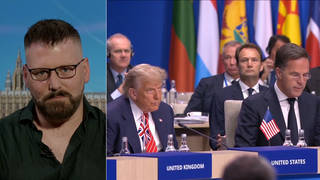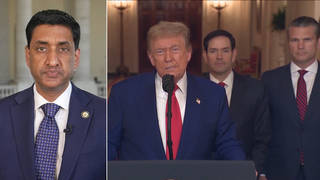Experience should teach us to be most on our guard to protect liberty when the government’s purposes are beneficent. Men born to freedom are naturally alert to repel invasion of their liberty by evil-minded rulers. The greatest dangers to liberty lurk in insidious encroachment by men of zeal, well-meaning but without understanding.
— Justice Louis D. Brandeis
 While the U.S. wages war abroad—bombing Iran, escalating conflict, and staging a spectacle of power for political gain—a different kind of war is being waged here at home.
While the U.S. wages war abroad—bombing Iran, escalating conflict, and staging a spectacle of power for political gain—a different kind of war is being waged here at home.
This war at home is quieter but no less destructive. The casualties are not in distant deserts or foreign cities. They are our freedoms, our communities, and the Constitution itself.
And the agents of this domestic war? Masked thugs. Unmarked vans. Raids. Roundups.
Detentions without due process. Retaliation against those who dare to question or challenge government authority. People made to disappear into bureaucratic black holes. Fear campaigns targeting immigrant communities and political dissenters alike. Surveillance weaponized to monitor and suppress lawful activity.
Packaged under the guise of national security—as all power grabs tend to be—this government-sanctioned thuggery masquerading as law-and-order is the face of the Trump Administration’s so-called war on illegal immigration.
Don’t fall for the propaganda that claims we’re being overrun by criminals or driven into the poorhouse by undocumented immigrants living off welfare.
The real threat to our way of life comes not from outside invaders, but from within: an unelected, unaccountable enforcement agency operating above the law.
President Trump insists that ICE (Immigration and Customs Enforcement) is focused on violent criminals, but the facts tell a different story (non-criminal ICE arrests have surged 800% in six months)—and that myth is precisely what enables the erosion of rights for everyone.
By painting enforcement as narrowly targeted, the administration obscures a far broader dragnet that sweeps up legal residents, naturalized citizens, and native-born Americans alike.
What begins with immigrants rarely ends there.
According to the Cato Institute, 65 percent of people taken by ICE had no convictions, and 93 percent had no violent convictions at all.
This isn’t targeted enforcement—it’s indiscriminate purging.
What ICE—an agency that increasingly resembles a modern-day Gestapo—is doing to immigrants today, it can and will do to citizens tomorrow: these are the early warning signs of a system already in motion.
The machinery is in place. The abuses are ongoing. And the constitutional safeguards we rely on are being ignored, dismantled, or bypassed entirely.
When legal residents, naturalized citizens, and native-born Americans are swept up in ICE’s raids, detained without cause, and subjected to treatment that defies every constitutional protection against government overreach, this isn’t about immigration.
It’s not about danger. It’s about power—unchecked and absolute.
This is authoritarianism by design.
Here are just a few examples of how ICE’s reach now extends far beyond a criminal class of undocumented immigrants:
This pattern of abuse is not accidental.
It reflects a deliberate strategy of fear and domination by ICE agents acting like an occupying army, intent on intimidating the population into submission while the Trump Administration redraws the boundaries of the Constitution for all within America’s borders, citizen and immigrant alike.
This is how you dismantle a constitutional republic: not in one dramatic moment, but through the steady erosion of rights, accountability, and rule of law—first for the marginalized, then for everyone.
When constitutional guarantees become conditional and oversight is systematically evaded, all Americans—regardless of status—stand vulnerable to a regime that governs by fear rather than freedom.
We’ve seen this playbook before.
It’s the same strategy used by fascist regimes to consolidate power—using fear, force, and propaganda to turn public institutions into instruments of oppression.
ICE raids often occur without warrants. Agents frequently detain individuals not charged with any crime. Homes, schools, hospitals, workplaces, and courthouses have all become targets. Agents in plain clothes swarm unsuspecting individuals, arrest them without explanation, and separate families under the pretense of national security. In many cases, masked agents refuse to identify themselves at all—creating a climate of terror where the public cannot distinguish lawful enforcement from lawless abduction.
This is not justice. It is intimidation. And it has become business as usual.
ICE has even begun deputizing local police departments to carry out these raids.
Through an expanded network of partnerships, ICE has turned routine traffic stops into pipelines for deportation. According to the Washington Post, immigrants stopped on the way to volleyball practice, picking up baby formula, or heading to job sites have been detained and, in some cases, sent to a notorious mega-prison in El Salvador.
This is what politicizing and weaponizing local police looks like.
Even members of Congress attempting to exercise constitutional oversight have been turned away from ICE facilities. As the New York Times reported, ICE now claims the authority to “deny a request or otherwise cancel” congressional visits based on vague “operational concerns”—effectively placing its operations beyond democratic scrutiny.
Beyond the high-profile arrests, the abuse runs deeper.
Julio Noriega, a 54-year-old American citizen, was snatched up off the street and detained in Chicago for 10 hours without explanation. Leonardo Garcia Venegas, a U.S.-born citizen, was detained because ICE dismissed his REAL ID as fake. Cary López Alvarado, a pregnant U.S. citizen, was handcuffed and arrested for challenging ICE agents who had followed her fiancé to work. Children, veterans, and immunocompromised individuals have all suffered under ICE’s dragnet.
These are not outliers. They are the product of a system that operates without meaningful checks.
ICE agents are rarely held accountable. Internal investigations are ineffective. Congress has abdicated oversight. Directives from the Trump administration—including those authored by Stephen Miller—have turbocharged deportations and loosened any remaining restraints.
From boots on the ground to bytes in the cloud, ICE’s unchecked power reflects a broader shift toward authoritarianism, fueled by high-tech surveillance, public indifference and minimal judicial oversight. The agency operates a sprawling digital dragnet: facial recognition, license plate readers, cellphone tracking, and partnerships with tech giants like Amazon and Palantir feed massive databases—often without warrants or oversight.
These same tools—hallmarks of a growing surveillance state—are now being quietly repurposed across other federal agencies, setting the stage for an integrated surveillance-policing regime that threatens the constitutional rights of every American.
This isn’t about safety. It’s about control.
These tools aren’t just targeting undocumented immigrants—they’re laying the digital scaffolding for a future in which everyone is watched, scored, and subject to state suspicion.
Quotas over justice. Algorithms over rights.
ICE’s operations have little to do with individualized threat assessments. What drives these raids is not public safety but bureaucratic performance. Field offices are under pressure to meet arrest quotas, creating a system that incentivizes indiscriminate sweeps over focused investigations.
As Jennie Taer writes for the NY Post:
“The Trump administration’s mandate to arrest 3,000 illegal migrants per day is forcing ICE agents to deprioritize going after dangerous criminals and targets with deportation orders, insiders warn. Instead, federal immigration officers are spending more time rounding up people off the streets… Agents are desperate to meet the White House’s high expectations, leading them to leave some dangerous criminal illegal migrants on the streets, and instead look for anyone they can get their hands on at the local Home Depot or bus stop.”
Predictive algorithms and flawed databases replace constitutional suspicion with digital hunches, turning enforcement into a numbers game and transforming communities into statistical targets.
Constitutional safeguards are being replaced by digital suspicion.
We now live in a nation where lawful dissent—especially from immigrants or those perceived as outsiders—can place someone under state suspicion. The line between investigation and persecution has been erased.
Fear needs fuel.
And ICE finds it in propaganda: just as the Gestapo used propaganda to justify its cruelty, ICE relies on the language of fear and division. When the government labels people “invaders,” “animals,” or “thugs,” it strips them of humanity—and strips us of our conscience.
This rhetoric serves to distract and divide. It normalizes abuse. And it ensures that, once targeted, no one is safe.
The construction of a new ICE mega-prison in Florida—nicknamed “Alligator Alcatraz” for its proposed moat and remote location—serves as a grotesque symbol of the Trump Administration’s mass deportation agenda: out of sight, beyond accountability, and surrounded by literal and bureaucratic barriers to due process.
And Trump’s shifting stance on industries that rely on migrant labor—one moment threatening crackdowns, the next signaling exemptions for hotels, farms, and construction—reveals what this campaign is really about: not security, but political theater.
It’s not about danger; it’s about dominance.
But the crisis isn’t just rhetorical. It’s systemic. Agents are trained to obey, not to question. Immunity shields misconduct. Whistleblowers are punished. Watchdogs are ignored. Courts too often defer to executive power.
This is not law enforcement—it is authoritarian enforcement.
And it’s not limited to immigrants. It’s creeping into every corner of American life.
When a government can detain its own citizens without due process, punish political dissent, and target individuals for what they believe or how they look, it is no longer governed by law. It is governed by fear.
The Constitution was designed to prevent this. But rights are meaningless when no one is held accountable for violating them.
That is why the solution must go beyond the ballot box.
We must dismantle the machinery of oppression that enables ICE to act as judge, jury, and jailer.
Congress must ban warrantless raids, end predictive profiling, and prohibit mass surveillance. It must enforce real oversight and revoke the legal shields that insulate abusive agents from consequences.
We must reassert the rule of law, not just through legislation, but through a cultural recommitment to constitutional values. That includes transparency, demilitarization, and equal protection for all—citizens and non-citizens alike.
This is not just a fight over immigration policy. It’s a battle for the soul of our nation.
ICE is not the exception. It is the prototype.
As I make clear in my books Battlefield America: The War on the American People and A Government of Wolves: The Emerging American Police State, the same blueprint is being applied across the federal landscape: to protest monitoring, dissent suppression, and data-mined predictive policing.
If we fail to dismantle the ICE model, we normalize it—and risk reproducing it everywhere else.
ICE has become the beta test—perfecting the merger of technology, policing, and executive power that could soon define American governance as a whole.
Make no mistake: when fear becomes law, freedom is the casualty.
If we don’t act soon, we may find that the Constitution is the next to be detained.
James Madison warned that “the accumulation of all powers, legislative, executive, and judiciary, in the same hands… may justly be pronounced the very definition of tyranny.”
When ICE acts as enforcer, jailer, and judge for the president, those fears are no longer theoretical—they are the daily reality for countless people within U.S. borders.
The post
America’s Most Lawless Agency: ICE Is the Prototype for Tyranny first appeared on
Dissident Voice.
This post was originally published on Dissident Voice.




